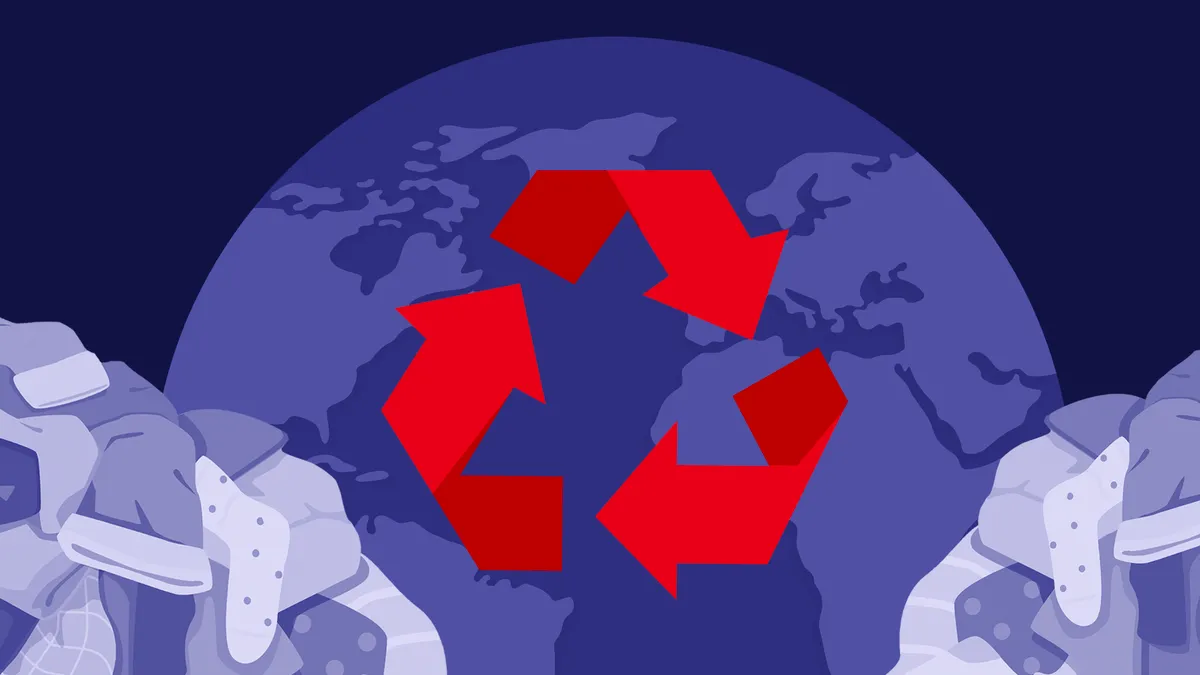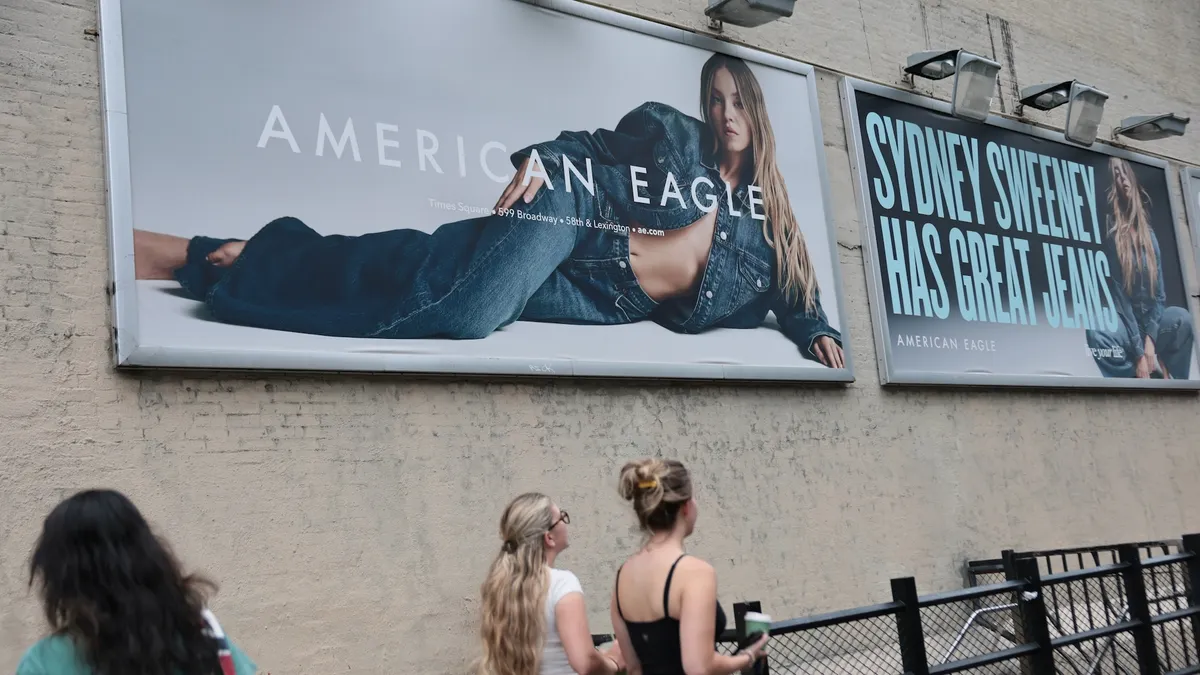Becoming a more environmentally responsible business has been a top priority in recent years for many retailers. But they don't seem to conform to the same idea of how to achieve it or how to measure their success.
Even before President Biden signed executive orders that put climate action at the forefront of federal policy, the decision had already garnered big support from some corporate giants. In a joint letter, 47 U.S. companies, including Walmart and Amazon, urged the President and members of Congress to create a bipartisan solution to address climate change.
Heightened pressure from the executive order and increasingly eco-conscious consumers have propelled retailers to set varying sustainability goals. But because corporate response to the climate crisis remains unregulated, experts warn that companies often end up making misleading claims — otherwise known as greenwashing.
"There have been very busy debates about what are the right metrics and what are the critical metrics and how do you compare one company with another based on what they publish," said John Godfrey, director of corporate affairs at Legal & General. "One of the worst things you can do as a company is to greenwash what you're doing by putting your own metrics and claiming that everything is honest when it isn't."
Product labels marked with buzzwords like "green," "sustainable" or "eco-friendly" can be confusing, and how exactly it influences the environment can be vague. The Federal Trade Commission issued a loose guideline on how companies can avoid exaggerating claims that mislead consumers. "[S]ometimes what companies think their green claims mean and what consumers really understand are two different things," according to the FTC's Green Guides.
Without a strict outline that keeps retailers accountable for how they market their products, Godfrey warns that the lack of transparency could hurt both the company and environmental progress as well.
The fashion industry is often closely associated with climate change. Without further abatement efforts beyond what is currently in place, the sector would produce up to 2.7 billion metric tons of greenhouse-gas emissions a year by 2030, according to a 2020 report from McKinsey & Company. If fashion keeps to its current pace on decarbonization initiatives, emissions should cap at around 2.1 billion metric tons, the same as it is today.
"Sooner or later, companies that [greenwash] tend to get found out, and the reputational damage is much worse if you've tried to basically mislead about your own green credentials," Godfrey said. "Climate has come a huge way in the last five years I would say. But part of the standardization is also about transparency, and increasingly companies are having to report on their environmental performance."
It's easy to see why brands, regardless of whether their values align with climate positivity, would want a slice of the sustainable products market. Back in 2018, Nielsen predicted that consumers would spend up to $150 billion on products deemed eco-friendly by 2021.
But some retailers are especially under scrutiny for launching seemingly eco-conscious initiatives and failing to provide adequate information about how exactly their products cause less environmental damage.
When H&M released its Conscious Collection, the Norwegian Consumer Authority promptly called the clothing company out for making deceptive marketing claims about its environmental benefits, several news outlets reported in 2019.
Ikea, which previously committed 200 million euros ($238.3 million) to become a climate-positive company by 2030, was embroiled with illegal logging in Ukraine last year. Earthsight, a non-governmental organization, alleged that Ikea's suppliers were illegally sourcing the wood used to build some of the retailer's chairs.
Combating greenwashing
Cracking down on retailers that mislead investors over climate positivity claims is easier said than done.
Ultimately, consumers have to do their own research to determine whether or not they're shopping sustainably. Regular shoppers often don't have enough information to determine how eco-friendly a company truly is, which makes it easy for companies to create a buzz around initiatives that fall short of making meaningful change, said Austin Whitman, CEO of Climate Neutral — a nonprofit working with brands to decrease carbon emissions.
"By writing your own rules, you choose what to emphasize, and consumers have a hard time evaluating whether that claim is meaningful or not," Whitman said. He added that "a company or a retailer can decide to do something one year because it feels like it's consistent with where the market is going, but then the next year back down from it because it's inconvenient, or it's too expensive."
The lack of policing is where independent environmentalist groups — like Climate Neutral, B Corp and SME Climate Hub for small- and medium-sized enterprises — have stepped in the past few years to spell out exactly what "going green" looks like in practice. Brands that want to receive certification must meet a certain set of standards to qualify.
Climate Neutral, for instance, outlines the certification process in three steps: Brands must first estimate the carbon emissions from making and delivering products, then offset last year's emissions by purchasing carbon credits and, finally, brands are required to implement a reduction action plan to minimize emissions over the next one to two years.
Businesses that attempt to acquire certification from Climate Neutral have instituted a combination of short-term decisions like changes to their travel policies and their product lineups, Whitman said.
"We're kind of trying to establish that the certification, which does have a single set of rules for all retailers, really should just be the basic expectation that consumers have of all companies out there," he said. He added that it should be "a standard procedure for companies to know what their carbon emissions are just in the same way that they know what their revenues are."
Green pledges can be an effective method of proving a brand's commitment to the environment as long as brands are authentic about their intentions, said Thomas Husson, vice president and principal analyst at Forrester. His research shows that shoppers have raised their expectations for environmental sustainability as a result of the pandemic and climate catastrophes.
Half of the U.S. adults online are varying degrees of green consumers, and they're now demanding more accountability from brands, a Forrester report states. The aftermath of the pandemic has caused 32% of U.S. consumers to go out of their way to purchase from brands dedicated to reducing their environmental impact, the report found.
Any global crisis is bound to accelerate existing trends, said Husson. The pandemic has forced consumers to recognize the link between human health and the reckless destruction of wildlife and its ecosystem, he said.
In the list of personal and societal issues exacerbated by the pandemic, 72% of respondents said they were concerned about climate change, and 40% said it made them fearful, according to the 2021 Edelman Trust Barometer.
"When you think about it, it's about like the medicine you're gonna inject in your body, it's about the food you eat, it's about the cosmetics and creams you put on your skin," Husson said. "I think this has raised awareness about the vulnerability and the fragility of the ecosystem."
Firms have even more reason to pay attention to eco-conscious consumers. Husson says these consumers have the highest purchasing power, and they are more willing to try new brands and products. His Forrester report also indicates that younger consumers put even more pressure on companies to be more transparent.
Retailers have to "think of environmental sustainability, moving forward, as a competitive advantage and as something they need to really tackle holistically," from supply chain and logistics to the company culture, Husson said. Green marketing and communication tend to be less relevant when consumers are more demanding, he said.
Businesses play a unique role in the climate issue, Kearney analysts said.
Among the world's four major institutions (business, NGOs, government and media), business ranked highest in terms of trust at 61%, and is the only institution perceived as ethical and competent, the recent Edelman Trust Barometer indicated.
"Consumers are trusting businesses, and they're looking to them to help them make sustainable decisions," said Katie Thomas, who leads the Kearney Consumer Institute. "Consumers don't always understand things like carbon footprint and things like that. While there's education to be done, it's also thinking about the different things that companies can do that are a little bit more achievable."
The idea of living sustainably appeals to consumers, but they often choose the path of least resistance, she said.
Going green can reap rewards
Climate action has plenty of perks: 71% of consumers said they took the environment into account when shopping in 2019, a survey from consulting firm Kearney shows. That number has only increased, reaching 83% in April last year during the early days of the pandemic.
Sustainable products continue to be in demand, especially for younger generations — suggesting that the trend will continue to grow, said Terry Toland, associate and thought leadership lead in Kearney's Global Business Policy Council.
Rising demand for eco-friendly products also jacks up competition between brands and may put the apparel market's profitability at risk. But the increasing number of socially aware consumers brings about new opportunities through models like renting or buying secondhand apparel, Moody's latest research said.
But with opportunities come risk — of both the financial and reputational kind.
Higher production and supply chain costs are on the horizon, along with shortage of raw materials like water and cotton, Moody's analysts said.
Environmental policies will also impact the financial health of existing companies and the growth of future ones. A February report from Kearney indicates that 79% of investors anticipate climate-related regulations to impact their choices over the next three years.
Investors are starting to recognize that climate change is a business risk, according to Kearney's 2020 FDI Confidence Index. The finding indicates that 77% of investors would consider climate change as a factor in their investment decision calculus and about 60% expect to lose money over climate change in the next three years.
"I think this speaks to the broader awareness among consumers and investors alike on the importance and the impact of climate change to their business dealings," said Toland. "I think that there will be direct financial implications for businesses as far as whether investors decide to go with them based on their stance on sustainability issues."
Vishal Agrawal, provost's distinguished associate professor at Georgetown University, said that the government might soon prioritize clean energy in their procurement. Retailers who meet the environmental standards might get a preference in the federal procurement system, he said.
"Whenever [the federal government] decides to prioritize something in their procurement, that automatically pushes manufacturers to offer those kinds of products, achieve economies of scale and things just become cheaper for anybody," he said. "The retail industry might benefit from these things which are perhaps, right now, cost-prohibitive to become much cheaper because of the economies of scale and the federal government's buying power."
Regulatory pressure could move the needle
President Biden's executive actions earlier this year include rejoining the Paris Climate Agreement, prioritizing policies backed by science and pledging to put the U.S. on an irreversible path to becoming a net-zero economy by 2050.
Experts agree that this is a step in the right direction.
Fashion alone contributes 10% of the world's annual carbon emissions, according to 2019 data published by the United Nations Environment Programme (UNEP) and the Ellen MacArthur Foundation. Agrawal says the retail industry's environmental impact happens mostly in its supply chain — from the process of collecting raw materials to transporting products around the globe and to households.
Though China remains the largest textile exporting and producing nation, according to data from Statista published last year, Americans still spend a significant portion of their budget on clothes. The average American spends $1,866 on clothing and apparel a year, according to a recent report from GOBankingRates.
"Yes, stores do generate some environmental impact, but that's probably not as big compared to the environmental impact associated with transportation of goods," Agrawal said. If investors or government bodies pressure retailers to show short-term results, companies are likely to make changes in their supply chain, he said, adding that, "it would be quite counterproductive to focus on this small piece of the puzzle."
Climate regulation is well on its way. The Securities and Exchange Commission has set up a 22-person task force to oversee the ESG-related misconduct of publicly traded companies.
Part of Biden's campaign promise on environmental justice is to require public companies to disclose their greenhouse gas emissions and climate risks from their business operations and supply chain.
"The act of being required to disclose things like emission levels results in changes in corporate behavior" even when corporate action isn't enforced, said Nicholas Muller, associate professor of economics, engineering, and public policy at Carnegie Mellon University, citing research from the university. "It's just saying you have to report how much you emit. That act changes how firms behave in a way that tends to lower their emissions."
In addition to becoming more exposed to shareholder scrutiny, having to disclose emissions levels in a given year allows companies to take into account factors that they may not have considered before, which may contribute to the behavioral changes, said Muller. And because carbon emissions are linked directly to energy usage, it may expose firms to opportunities for efficiency gains, he said.
In his nomination speech last winter, the now sworn in Administrator of the Environmental Protection Agency, Michael Regan, said that environmental protection needs an all-in approach from industries to individuals.
In response to the possibility of the EPA keeping businesses accountable for their environmental impact, a spokesperson told Retail Dive by email that the agency "will follow the science and law in accordance with the Biden-Harris Administration's executive orders and other directives in reviewing all of the agency's actions issued under the previous Administration to ensure that they protect public health and the environment, tackle the climate crisis and air pollution, advance environmental justice, restore science, and build back better."
How retailers can keep an eye on their supply chain can be a tricky situation, said Godfrey. Retailers also have to exert some pressure on their suppliers to address areas they know can be improved, he said.
"It can be quite difficult to know exactly what is happening at the far end of the supply chain and on the other side of the world," he said. "You may be squeaky clean in one part of your operation, but that doesn't really give you the right answer if you're just pushing the bad stuff to somewhere else," whether it be climate or human rights violations, he added.
Steps toward standardization like the executive order and the SEC task force may push retailers to do as much auditing as possible to ensure they prevent environmental harm for their own self-interest, Godfrey said.
"The important thing about something like the executive order is not just that it works in the U.S.," Godfrey said. "The influence of [the executive order] is spread more broadly so that environmental damage isn't simply pushed to somewhere else."
























